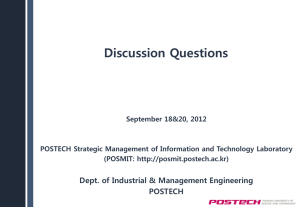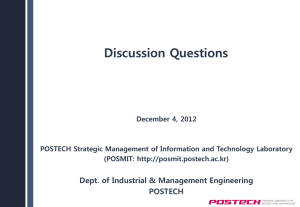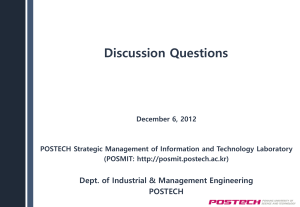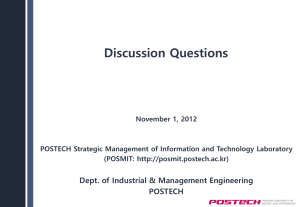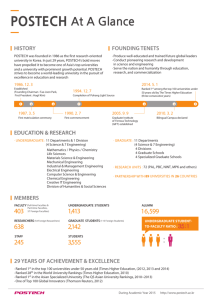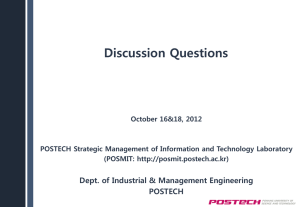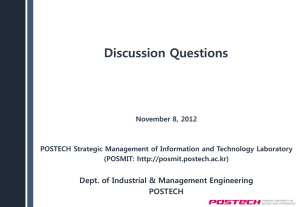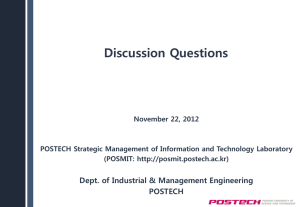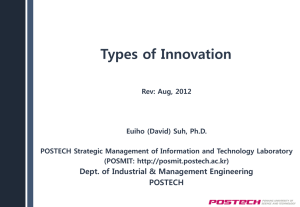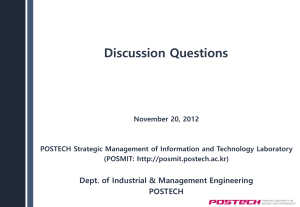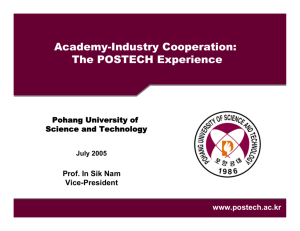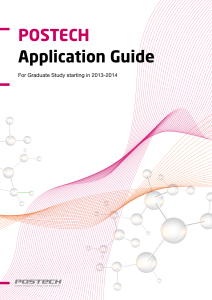Introduction
advertisement
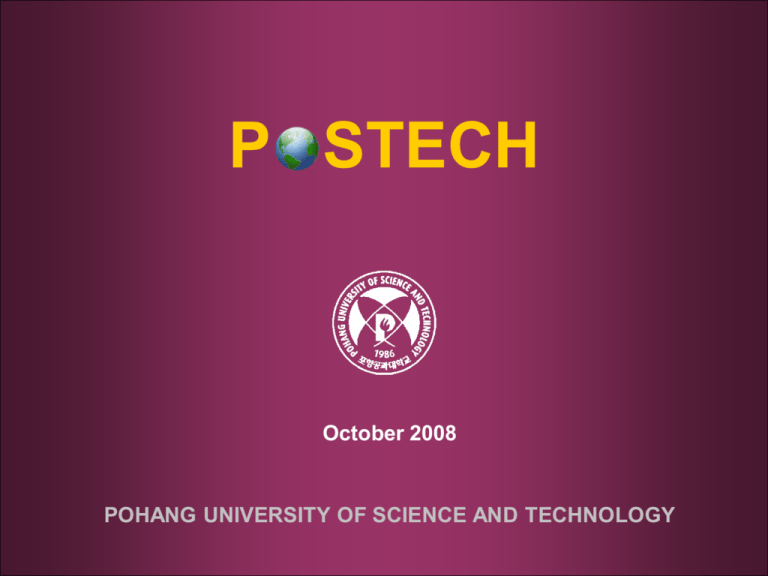
P STECH October 2008 POHANG UNIVERSITY OF SCIENCE AND TECHNOLOGY Campus Pohang Technopark PAL(1) Land: 1,731,759m² Student Dormitory and Apartments Faculty Apartment Building: 423,758m² POSCO International Center Student: 2,942 Tae-Joon Park Digital Library PBC(4) Biotech Center PIRO(3) Main Campus 1,377 (undergraduate) 1,642 (graduate) Faculty: 237 Researcher: 673 (Post-doctoral: 185) Staff: 232 RIST(2) RIST (2) Regular: 205 Others: 27 (As of April 2008) (1) PAL: Pohang Accelerator Laboratory (2) RIST: Research Institute of Industrial Science and Technology (3) PIRO: Pohang Institute of Intelligent Robotics (4) PBC: POSTECH Biotechnology Center Infrastructure Pohang Accelerator Laboratory (PAL) Storage Ring Linear Accelerator Administration building Linear accelerator 160m long, 2.5 GeV Storage ring 2.5 GeV, 12-period Triple Bend Achromat lattice, low emittance third generation machine, 280m in circumference Beamlines Operating 23 beamlines Users More than 1,000 per year THINKING OF SCIENCE, THE NATION AND THE FUTURE Academic Programs • 10 undergraduate departments, 14 graduate programs • Faculty to undergraduate students ratio: 1 to 6 • Admit 300 freshmen per year representing top 1% of high school graduates Undergraduate Chemistry Life Science Mathematics Physics Chemical Eng. Computer Science & Eng. Electrical & Electronic Eng. Industrial & Management Eng. Materials Science & Eng. Mechanical Eng. (Division of Humanities & Social Sciences) THINKING OF SCIENCE, THE NATION AND THE FUTURE Graduate Chemistry Molecular & Life Sciences Mathematics Physics Chemical Eng. Electrical & Computer Eng. Materials Science & Eng. Mechanical & Industrial Eng. School of Interdisciplinary Biosci. & Bioeng. School of Environmental Science & Eng. Graduate School for Information Tech. Graduate School for Wind Energy Graduate Institute of Ferrous Technology Technology Innovation & Management Graduate Program Research Publications Total SCI Year 1998 1999 2000 2001 2002 2003 2004 2005 2006 2007 Total 1,180 1,257 1,310 1,176 1,219 1,250 1,466 1,203 1,259 1,328 SCI SCI 566 586 585 732 790 964 1,069 939 1,103 1,053 2.9 2.9 2.9 3.5 3.8 4.7 5.2 4.4 5.0 4.6 2.17 2.21 2.17 2.15 2.23 2.40 2.54 (per Faculty) Impact Factor Research Grants per Faculty (Unit: 1,000 USD) O/H Total Year Total Per Faculty ‘98 ‘99 ’00 ‘01 ’02 Per Faculty ‘03 ‘04 ‘05 ‘06 ‘07 36,624 49,529 68,598 73,051 65,213 66,996 101,740 97,810 115,327 123,847 178 236 324 338 308 316 478 435 500 520 International Ranking The Times Higher Education Supplement 2007 World Top 20 – Citations per Faculty 1 CALIFORNIA Institute of Technology (Caltech) United States 100 2 STANFORD University United States 99.9 3 MASSACHUSETTS Institute of Technology (MIT) United States 98.4 4 Ecole Normale Supérieure, PARIS France 98.3 5 University of ALABAMA United States 98.2 6 PRINCETON University United States 96.5 7 HARVARD University United States 95.9 8 JOHNS HOPKINS University United States 95.8 9 University of CALIFORNIA, San Diego United States 95.4 9 University of ZURICH Switzerland 95.4 11 University of WISCONSIN-Madison United States 94.8 11 POHANG University of Science and Technology Korea, South 94.8 13 CORNELL University United States 93.2 14 University of TORONTO Canada 93.1 14 LEIDEN University Netherlands 93.1 16 GEORGIA Institute of Technology United States 92.7 17 University of HELSINKI Finland 92.6 18 DUKE University United States 92.4 18 University of California, BERKELEY United States 92.4 20 HONG KONG University of Science & Technology Hong Kong 92 THINKING OF SCIENCE, THE NATION AND THE FUTURE Citation Highest Citation Number per Paper in the Nation Citation per paper (1/1/1997 ~ 8/31/2007) 27.1 (’06) 21.3 (’06) 5.46 (’06) 4.82 (’05) 6.61 (’06) 5.82 (’05) 22.4 (’06) 7.66 (’06) 6.51 (’05) Essential Science Indicators updated on November 1, 2007 THINKING OF SCIENCE, THE NATION AND THE FUTURE Research Grants by Sponsor (Unit: 1,000 USD) POSTECH POSCO Government Industry Others Year 1998 1999 2000 2001 2002 2003 2004 2005 2006 2007 POSTECH 1,027 1,864 1,723 4,081 2,942 2,210 4,120 2,387 5,436 6,300 POSCO Government Industry Others 7,524 24,628 2,331 1,114 12,364 32,226 2,246 829 27,945 32,413 6,128 389 27,110 37,987 3,522 351 13,277 43,202 4,957 835 14,532 45,142 3,887 1,225 19,621 71,148 5,757 1,094 21,245 67,119 6,243 816 27,032 75,665 6,003 1,191 30,316 79,091 7,921 219 Total 36,624 49,529 68,598 73,051 65,213 66,996 101,740 97,810 115,327 123,847 Thank You POSTECH VISION Overview VISION World’s top 20 by 2020 Foster talent in S&T OBJECTIVE (creative, progressive, global leaders) Create research breakthroughs (strong academic & social impact) Selection & Concentration Interdisciplinary Programs Globalization Process Innovation STRATEGY 3. Faculty 1. Education 4. Global Visibility 5. Financial Founding principles 2. Research International Ranking The Times Higher Education Supplement 2007 Overall Ranking of POSTECH : 233 Criteria Peer Review Recruiter Review Int’l Faculty Int’l Student Faculty/ Student Citation/ Faculty Overall Score (Rank) Weighting of Item 40% 10% 5% 5% 20% 20% - Seoul National Univ. 92 (42) 54 (146) 16 (192) 24 (181) 80 (56) 79 (88) 77.1 (51) KAIST 65 (136) 27 (370) 53 (186) 28 (367) 64 (142) 85 (71) 63.7 (132) POSTECH 29.8 (372) 30 (344) 40 16 65 95 (11) 51.0 (233) THINKING OF SCIENCE, THE NATION AND THE FUTURE International Network 73 sister universities in 19 countries across the world Australia (4) The Australian National U U of Melbourne U of Newcastle U of New South Wales Austria (1) Technische Universität Graz Canada (1) U of Waterloo China (13) Fudan U Harbin Institute of Technology Nanjing U Northeastern U Peking U Shanghai Jiao Tong U Tsinghua U U of Electronic Science & Technology of China U of Science & Technology Beijing U of Science & Technology of China Xian Jiaotong U Yanbian U of Science & Technology Zhejiang U Denmark (1) Technical U of Denmark France (10) École Centrale de Nantes École Nationale Supérieure des Mines de Paris Institut National Polytechnique de Grenoble Institut National Polytechnique de Toulouse Université de Technologie de Compiègne Université de Technologie de Belfort-Montbéliard Université de Technologie de Troyes Institut National des Sciences Appliquées de Lyon (INSA-Lyon) École Nationale Supérieure d’ingénieurs de Caen École Polytechnique Germany (5) Freie Universität Berlin Max Planck Gesellschaft RWTH Aachen Technische Universität Berlin Technische Universität Kaiserslautern Italy (1) Politechnico di Torino Japan (6) Kyoto U Kyushu U Ritsumeikan U Ritsumeikan Asia Pacific U Tohoku U Tokyo Institute of Technology Democratic People’s Republic of Korea (1) New Zealand (1) Pyongyang U of Science and Technology U of Auckland Russia (5) Moscow Engineering Physics Institute Moscow State U St. Petersburg Electrotechnical U The Joint Institute of Nuclear Research St. Petersburg State Polytechnical U Slovakia (1) Slovak U of Technology in Bratislava Switzerland (1) Eidgenössische Technische Hochschule Zürich Thailand (1) Suranaree U of Technology Taiwan (3) National Cheng Kung U National Tsing Hua U National Taiwan U United Kingdom (2) Imperial College of Science, Technology & Medicine U of Birmingham United States (12) Carnegie Mellon U U of California, Berkeley U of California, Davis U of California, Merced U of Maryland, College Park U of Minnesota, Twin Cities California Institute of Technology U of Illinois at Urbana-Champaign Princeton Plasma Physics Laboratory Rensselaer Polytechnic University Syracuse U U of Washington, Seattle Vietnam (4) Hanoi U of Technology Vietnam National U, Hanoi Vietnam National U, Ho Chi Minh Vietnamese Academy of Science and Technology Chronology 1986 1992 • Pohang Institute of Science and Technology open as the first research-oriented university in Korea • Graduate School of Information Technology (GSIT) open 1994 • Pohang Accelerator Laboratory, PAL (3rd-generation accelerator: 2 GeV) open • Change official name to Pohang University of Science and Technology 1995 • Graduate School of Iron & Steel Technology (GSIST) open 1996 • School of Environmental Science and Engineering (SEE) open 1998 • Asiaweek Magazine (1) rank POSTECH #1 among Asian science & technology univ. 2001 • Asia Pacific Center for Theoretical Physics (APCTP) headquarters move to POSTECH 2002 • JoongAng Daily (2) rank POSTECH #1 among Korean universities • Ministry of Education & Human Resources select POSTECH as ‘Excellent university for educational reform’ (7 years in a row) 2003 • POSTECH Biotech Center, PBC open • JoongAng Daily rank POSTECH #1 among Korean universities • Tae-Joon Park Digital Library open 2005 • JoongAng Daily rank POSTECH #1 among Korean universities (4 years in a row) 2006 • POSTECH Vision 2020 Declaration Ceremony 2007 • JoongAng Daily rank POSTECH #1 among Korean universities • The Times Higher Education Supplement (3) rank POSTECH #11 in Citations per Faculty (1) Published in Hong Kong (2) Major Korean daily newspaper (3) Published in United Kingdom THINKING OF SCIENCE, THE NATION AND THE FUTURE Infrastructure National Center for Nanomaterials Technology (NCNT) • Support nanomaterials industrialization • Establish academy-industry cooperation • Train manpower in the field of nanomaterials Pohang Institute of Intelligent Robotics (PIRO) • Service robot: moving platform, operating, intelligence technology • Bio-medical robot: cell operating, haptic medical robot, diagnosis robot • Ocean floor robot: probing, picking minerals THINKING OF SCIENCE, THE NATION AND THE FUTURE Infrastructure POSCO International Center Main Campus POSCO Int’l Center Overview Area: 17,032 m2 (5 ground, 2 basement levels) Main facilities: conference area, hotel, dining facilities Purpose International conferences to promote academic and research collaborations THINKING OF SCIENCE, THE NATION AND THE FUTURE Infrastructure Tae-Joon Park Digital Library • Digitalization/internet DB construction of academic information • Information hub with cyber function • Providing an environment for various multimedia utilization POSTECH Biotechnology Center (PBC) • Cutting-edge research and education in biotechnology, academia-industry cooperation • Major research areas: molecular medicine, plant biotechnology, nanobiotechnology, basic sciences & technology THINKING OF SCIENCE, THE NATION AND THE FUTURE Graduate Program Greater emphasis on Ph.D. programs to enhance competitiveness Ratio of students entering graduate schools (Year) MS students PhD students incl. M.S.-Ph.D. Integrative Program THINKING OF SCIENCE, THE NATION AND THE FUTURE What makes POSTECH unique in Korea? 1 The best research-oriented university in Korea 2 Small in size but excellence in quality 3 Low faculty to student ratio 4 Highest education investment in Korea 5 Scholarships/assistantships for all students 6 Lodging provided for all academic members 7 Outstanding faculty 8 World-class research achievement 9 Strong academy-industry cooperation 10 Location and strong community support THINKING OF SCIENCE, THE NATION AND THE FUTURE
